Catégories
Documents disponibles dans cette catégorie (2558)
 Ajouter le résultat dans votre panier Affiner la recherche
Ajouter le résultat dans votre panier Affiner la recherche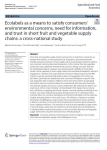
Article
Short food supply chains (SFSCs) are increasingly regarded as promising alternatives to industrialized food distribution systems. They aim to create geographical, logistical, and social proximity between food producers and consumers. Despite ext[...]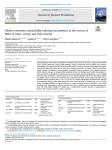
Article
Implementing the United Nations Sustainable Development Goals (SDGs) in the water, energy, and food (WEF) sectors requires addressing complex global challenges related to balancing resource demand and ecosystem sustainability. This study introdu[...]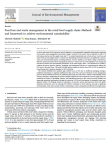
Article
Food loss and waste (FLW) represents critical challenge to environmentally sustainable development, impacting food security, waste management, and climate change. One-third of the world's food is disposed of, with 13 % lost between harvest and t[...]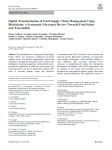
Article
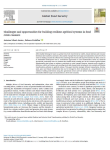
Article
After steadily declining for years on a global level, food crises driven by conflict, climate extremes and economic downturns have marked an increase in the number of people who face hunger and malnutrition since 2015. Food crises are leading co[...]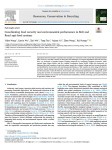
Article
Agricultural and food security cooperation has emerged as a cornerstone of the current Belt and Road Initiative (BRI). However, most BRI countries are facing the twin challenges of ecological degradation and food insecurity. Here, we developed a[...]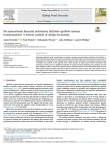
Article
J. Porciello ; P. Winters ; M. Farrae ; J. McKenna ; L. Phillips |Supporting agrifood system transformation to improve outcomes around climate, nutrition, and inclusion requires that institutions and governments work together. International financial institutions play a pivotal role in shaping global developme[...]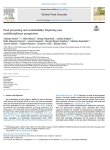
Article
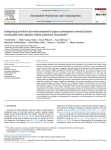
Article
V. Kyttä ; H.U. Ghani ; T. Pellinen ; A. Kårlund ; M. Kolehmainen ; A.-M. Pajari ; H.L. Tuomisto ; M. Saarinen |Environmentally sustainable and nutritionally adequate food consumption and production can include a wide selection of foods, which requires detailed information on individual food products to enable sustainable food choices. The aim of this stu[...]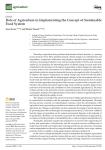
Article
Nowadays, agriculture faces problems that threaten its basic function, i [...]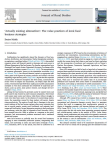
Article
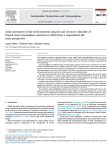
Article
Five prospective scenarios combining changes in diets, supply chains, and agricultural practices have been proposed for French food consumption in 2050, including a business-as-usual (BAU) situation. This study aims to perform a joint assessment[...]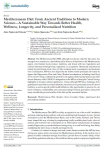
Article
The Mediterranean Diet (MD), although not always called by this name, has emerged over centuries as a diet influenced by diverse civilizations in the Mediterranean region, who blended local produce, traditions, and rituals with new ingredients a[...]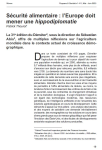
Article
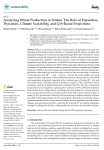
Article
I. Farhan ; H. Sarayrah ; W. Hayek ; H. Alkhasoneh ; F. Almayouf |Wheat, a cornerstone of Jordan’s food security and agricultural economy, has experienced fluctuating production dynamics. Population growth, climate variability, and the gradual integration of advanced farming technologies drive these fluctuatio[...]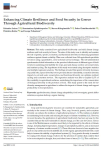
Article
E. Loizou ; K. Spinthiropoulos ; S. Kalogiannidis ; F. Chatzitheodoridis ; D. Kalfas ; G. Tzilantonis |This study examined how agricultural biodiversity can build climate change resilience and food security in Greece. The aims of this study were to identify and examine the role of genetic, species, ecosystem, and functional diversity in enhancing[...]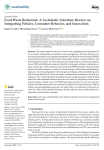
Article
This article addresses the issue of food waste, highlighting its implications for food security, sustainability, and global resource management. The main objective is to develop the principles for an Integrated Sustainable Food Waste Reduction S[...]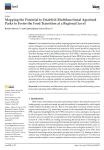
Article
Food transition has been widely inspiring regional and local food system transformation strategies to accomplish the Sustainable Development Agenda goals. Considering the urgency required to transform food systems by 2030, actions should be supp[...]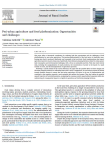
Article
This paper offers a theoretical contribution by outlining both the opportunities and the challenges of food platformisation for peri-urban agriculture. The growing platformisation of the food sector is drastically transforming how food is produc[...]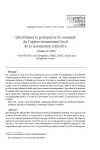
Article
En s'appuyant sur une revue de la littérature et sur ses activités d'enseignement et de recherche, l'auteur engage un débat sur le « pourquoi » et le « comment » de l'approvisionnent local de la restauration collective. Il défend tout d'abord qu[...]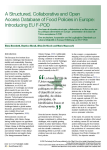
Article
This paper presents a new, open-access database of food policies, the European Food Policy Database (EU F-POD). It is a comprehensive and collaborative on-line resource, and goes beyond a mere list of food policies by offering a structured colle[...]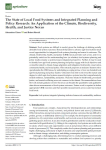
Article
Food systems are difficult to model, given the challenge of defining socially desirable food system outcomes. Research that aims to advance agri-food systems must reveal opportunities for integrated food systems planning and assess its outcomes.[...]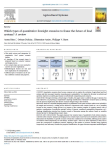
Article
CONTEXT Quantitative scenarios have become common tools to explore the evolution of agricultural and food systems and their necessary transition towards greater sustainability. Yet, despite the diversity in methods and questions explored, a nota[...]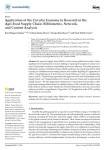
Article
The agri-food supply chain (AFSC) is vital to ensure global food security. It faces significant environmental and economic challenges, requiring the adoption of circular economy (CE) principles to enhance sustainability and resource efficiency. [...]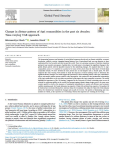
Article
The burgeoning frequency and intensity of varied global exogenous shocks such as climate variability, economic slowdowns, conflicts, scarcity, changing demand pattern, loss of Agricultural land, new age diseases etc have undermined the food secu[...]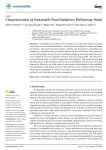
Article
S.G. Florença ; A.L. Amaral ; F. Costa ; R.P.F. Guiné ; C.A. Costa |A sustainable food system can be described as a system that ensures economic, social, and environmental sustainability to secure food and nutrition for current and future generations. The present research aimed to identify and characterize susta[...]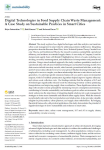
Article
This study explores how digital technologies and data analytics can transform urban waste management in smart cities by addressing systemic inefficiencies. Integrating perspectives from the Resource-Based View, Socio-Technical Systems Theory, Ci[...]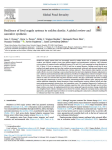
Article
I.Y. Huang ; O.A. Forero ; E.V. Wagner-Medina ; H. Florez Diaz ; O. Tremma ; X. Fargetton ; J. Lowenberg-DeBoer |Global food supply systems (FSS) are increasingly tested by sudden shocks such as pandemics, geopolitical conflicts, and extreme weather events, that demand adaptive and transformative responses. This systematic review analyses 26 empirical stud[...]
Article
V. Guerrieri ; S. Borchardt ; G. Listorti ; L. Marelli ; M. Vittuari |The unsustainable nature of prevailing food systems contributes to drive humanity out of a safe operating space. Despite recognising the need for food systems transformation, its direction diverges into different sustainability narratives and co[...]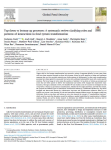
Article
C. Conti ; A. Hall ; E.A. Moallemi ; A. Laila ; C. Béné ; J. Fanzo ; M.F. Gibson ; L. Gordon ; C. Hicks ; K. Kok ; N. Rao ; R. Laxminarayan ; D. Mason-D'Croz |Urgent calls for food system transformation have spurred a variety of responses globally. In some cases, these calls have been answered through top-down led processes, driven by public agencies to design and implement measures that can drive soc[...]










